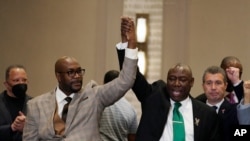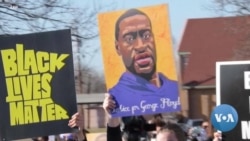The jury in the trial of former Minneapolis police officer Derek Chauvin for the murder of George Floyd delivered swift and unanimous verdicts Tuesday: guilty on all three counts.
The seven women and five men deliberated for a little more than 10 hours over the course of two days before finding Chauvin, a white veteran police officer, guilty of second-degree murder, third-degree murder and second-degree manslaughter in the death of a Black man who was arrested last year on suspicion of passing a counterfeit $20 bill.
Chauvin was accused of killing Floyd by pressing his knee to Floyd's neck on a street for 9 1/2 minutes during an arrest on May 25. Chauvin's defense team argued that the use of force was reasonable in light of Floyd's large size and suspected drug use, but the jury didn't find the argument persuasive.
The speed with which the jury delivered its verdict underscored the strength of the prosecution's case, said David Schultz, a visiting law professor at the University of Minnesota and professor of political science at Hamline University.
"At the end of the day, I think the jury was persuaded that Derek Chauvin did not act reasonably and that he was the substantial cause of the death of George Floyd," Schultz said. "So this is a big victory in court for the prosecution."
The death of Floyd in police custody became a symbol of police brutality and sparked worldwide protests against racism. The unanimous verdict was celebrated by large crowds gathered outside the Hennepin County Government Center in Minneapolis and in cities across the country and around the world.
WATCH: Why BLM Protests Will Continue
Presiding Judge Peter A. Cahill suspended Chauvin's bail and sent him to jail, where he will wait eight weeks for sentencing.
At its heart, the case was "really sort of an indictment of the American criminal justice system" and racism in America, Schultz said.
Here is a look at how the jury arrived at its verdict.
The trial
The verdict followed a trial that lasted nearly three weeks and featured testimony by dozens of prosecution and defense witnesses.
The jurors
Of the 12 members of the anonymous jury, six were white, four were Black and two were multiracial. They were selected from a pool of more than 100 candidates interviewed before the start of the trial last month.
Deliberation
Jurors began reviewing the case late Monday after closing arguments by prosecutors and the defense team. They spent four hours deliberating on Monday and a little more than six on Tuesday.
By contrast, jurors in the high-profile trial of four Los Angeles police officers accused of beating African American Rodney King in 1992 deliberated for seven days before acquitting three of the officers of using excessive force and deadlocking on the fourth, noted Kimberly Wehle, a law professor at the University of Baltimore.
The swift verdict Tuesday suggests the jurors "all had largely made up their minds at the closings," Wehle said.
Before they began their deliberations, the jurors received instructions from Cahill, a Hennepin County District Court judge, on the charges and how to arrive at a decision. To find Chauvin guilty of a crime, the jury must determine that his use of force against Floyd was "not authorized by law," Cahill said.
Each criminal charge had a number of elements that had to be proved. For example, the most serious second-degree murder charge required not only proof that Chauvin caused Floyd's death but also evidence that the former officer assaulted or attempted to assault Floyd at the time, causing his death.
Cahill advised the jurors to apply the "rules of law" in the case, even if they disagreed with the law, telling them they could take as long as they needed to reach a verdict.
Multiple outcomes
Given that Chauvin faced three separate criminal charges, the verdicts could have gone any number of ways. He could have been found guilty of one, two or all three charges. Alternatively, he could have been acquitted of all three charges, or the jury could have deadlocked, leading to a mistrial.
Prison sentence
Under Minnesota sentencing guidelines, Chauvin faces 11 ½ years for second-degree murder, 10 ½ years for third-degree murder, and four years for second-degree manslaughter. However, if there are aggravating factors, the judge could impose longer sentences.
Possible appeal?
Chauvin's defense team can appeal the verdict on the basis of a number of factors, from allegations of prosecutorial misconduct to claims of error in law.
Throughout the trial, the defense was "preserving issues for appeal," according to Wehle. To that end, defense lawyers raised objections to certain lines of testimony.
"If they don't put it on the record before the district court, it's hard to have a basis for an appeal," Wehle said.
Federal prosecution
It is not clear how the verdict would impact a parallel federal investigation into the Floyd murder. A federal grand jury panel has heard testimony, but prosecutors have not said whether they intend to proceed with an indictment.
In a statement, Attorney General Merrick Garland said the Department of Justice investigation into the case is ongoing.






